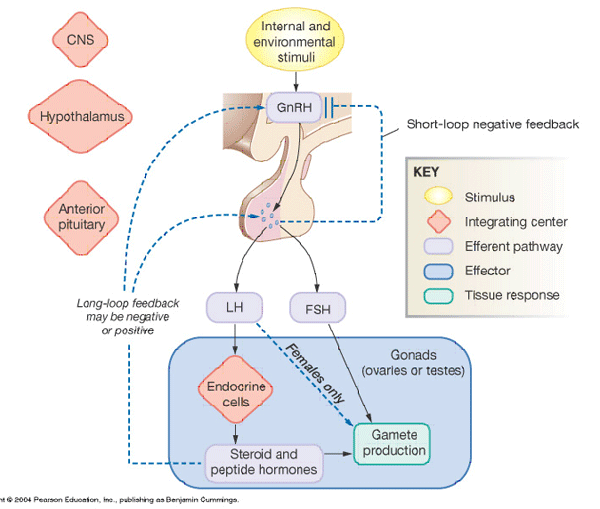Page Contents
OVERVIEW
This page focuses on the hormonal pathways that control the production of gonad hormones important for reproduction. This hormone signaling axis is more confusing then the rest, however this page is dedicated to simplifying the pathway to its core essentials.
GnRH (hypothalamus) => LH/FSH (pituitary) => testosterone/estrogen (gonads) =>target physiology

HYPOTHALAMUS
The hypothalamus starts off this hormonal pathway by the release of gonadotropin-releasing hormone (GnRH). This hormone acts upon the anterior pituitary in order to release both luteinizing hormone (LH) and follicle stimulating hormone (FSH).
Factors that increase GnRH secretion include the following:
- Internal/environmental stimuli (such as puberty)
Factors that decrease GnRH secretion include the following:
- LH/FSH (short loop negative feedback)
- Estrogen/Testosterone (long loop negative feedback)
ANTERIOR PITUITARY: FSH
The anterior pituitary continues this signaling pathway by releasing FSH (which in turn acts on the gonads)
Factors that increase FSH secretion include the following:
- GnRH
- Activins
Factors that decrease FSH secretion include the following:
- Sex steroid negative feedback
- Inhibins
- Follistatin: these suppress FSH by binding to and inactivating activins
ANTERIOR PITUITARY: LH
The anterior pituitary continues this signaling pathway by releasing LH (which in turn acts on the gonads)
Factors that increase LH secretion include the following:
- GnRH
Factors that decrease LH secretion include the following:
- Sex steroid negative feedback
- Inhibins
GONADS: ACTION OF FSH
In males: FSH is important for spermatogenesis
In females: FSH is important for maintaining the survival of follicles.
GONADS: ACTION OF LH
In males: LH acts on the leydig cells of males to aid in testosterone production
In females: LH is important for estrogen (estradiol) production
WHAT DOES TESTOSTERONE DO IN MALES?
Testosterone is important for the following biological processes:
- Development/maintenance of secondary sex characteristics and libido
- Spermatogenesis
WHAT DOES ESTROGEN DO IN FEMALES?
Estrogen is important for the following biological processes:
- Development/maintenance of secondary sex characteristics
- Maturation of the uterus
WHAT DOES PROGESTERONE DO IN FEMALES?
Progesterone is important for the following biological processes:
- Preparation/maintenance of endometrium for implantation of fertilized ovum
Page Updated: 02.21.2016